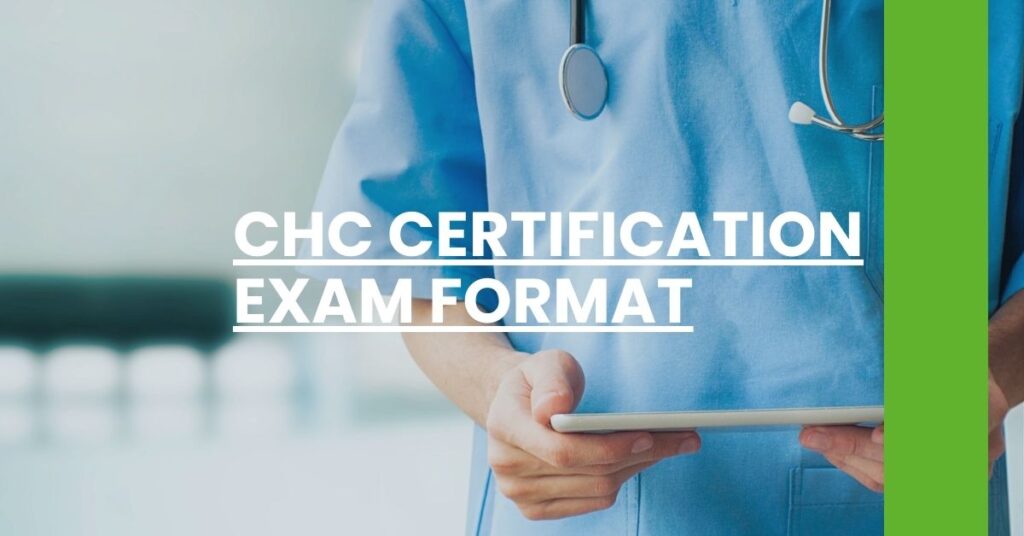The CHC Certification Exam Format consists of 120 multiple-choice questions that assess a candidate’s knowledge in healthcare compliance. The exam is structured to evaluate seven content areas, each carrying a different weight towards your final score.
In this guide, we’ll cover:
- Eligibility requirements to sit for the exam
- Content areas and their respective weightage
- Strategies and resources for effective preparation
Ensure you meet the prerequisites and mark your calendar — a well-prepared candidate is one step closer to CHC certification success.
- Overview of CHC Certification
- Exam Eligibility and Prerequisites
- Structure of the CHC Exam
- Content Areas and Weightage
- Duration and Passing Criteria
- Preparation Strategies for CHC Exam
- Registration and Scheduling
- Retake Policy and Continuing Education
- Navigating Exam Outcome and Certification Maintenance
- Resources and Study Aids
- Conclusion: Keys to Success on the CHC Exam
Overview of CHC Certification
As a healthcare compliance professional, the Certified in Healthcare Compliance (CHC) designation is a significant step in elevating your career and showcasing your expertise. The CHC certification is specially designed for individuals aiming to navigate the complexities of regulatory requirements within the healthcare sector effectively. By achieving this certification, you demonstrate a profound commitment to upholding the highest standards of compliance and ethical conduct.
Who is the certification for? Whether you are a compliance officer, manager, or auditor, or you work in risk management within the healthcare industry, the CHC can be a career-defining achievement. Earning the CHC credentials enforces your professional stature and opens up avenues for advancement by proving to employers and peers that you have a thorough understanding of the regulations that govern healthcare practices.
Being certified involves an examination process meticulously developed to evaluate your knowledge and practical application skills within healthcare compliance. The CHC certification exam format is crucial for you to understand as it frames the entirety of your preparation strategy.
Exam Eligibility and Prerequisites
To sit for the CHC exam, you must first meet a set of criteria that reflect both academic and professional experiences. The essence of these prerequisites is to ensure that you possess not only the foundational knowledge but also practical exposure to healthcare compliance.
- Academic Credentials: A bachelor’s degree or higher from an accredited institution is typically required, although there are pathways for those without degrees based on additional work experience.
- Professional Experience: You’ll need a minimum amount of work experience in healthcare compliance; the specific time frame depends on your level of academic education.
- CEUs (Continuing Education Units): Accumulate a certain number of CEUs in compliance-related educational activities before taking the exam.
Keep in mind that these requirements are not just bureaucratic hoops to jump through. They underscore the importance and seriousness of the role you are preparing to validate with your certification. For a detailed breakdown of the prerequisites, the Health Care Compliance Association provides valuable resources.
Structure of the CHC Exam
Understanding the structure of the CHC exam is pivotal to your success. It’s not just about what you know; it’s about demonstrating that knowledge within the confines of the CHC exam format.
- Question Format: The exam consists of 120 multiple-choice questions. These questions challenge your problem-solving abilities and assess your practical and theoretical knowledge simultaneously.
- Content Breakdown: Of the 120 questions, 100 are scored and used to determine your standing. The remaining 20 questions are pre-test questions that are not scored and are used to gather statistical data for future exams.
- Time Allotted: The current structure allots ample time for you to read, understand, and answer each question thoughtfully.
This structured approach not only validates your knowledge but aims to evaluate your critical thinking and decision-making skills, especially under timed conditions. For a comprehensive look at the topics and content areas on the exam, you may refer to the detailed content outline available through HCCA’s resources.
Content Areas and Weightage
The CHC exam is designed to assess a broad range of knowledge areas pertinent to the healthcare compliance profession. The questions are split across several core content domains, each accounting for a percentage of the total exam:
- Standards, Policies, and Procedures: Foundational elements of any compliance program.
- Compliance Program Administration: Day-to-day management and oversight capabilities.
- Screening and Evaluation of Employees, Physicians, Vendors and other Agents: Critical due diligence processes to mitigate risk.
- Compliance Education and Training: The ability to develop and deliver effective compliance training.
- Monitoring, Auditing, and Internal Reporting Systems: Systems that ensure ongoing compliance and prompt internal reporting of any shortcomings.
- Discipline for Non-Compliance: Addressing and disciplining instances of non-compliance.
- Response and Prevention to Compliance Issues: Responding appropriately to detected offenses and undertaking corrective action.
Each domain contributes to your overall ability to execute in a compliance role, reflecting real-world scenarios you might encounter. Dive into the specifics of each content area with the outlined weightage to understand where to focus your study efforts. More detailed information can be found in the HCCA’s CHC Candidate Handbook.
Duration and Passing Criteria
Let’s talk timing and scores – two key elements you cannot afford to overlook. The CHC exam grants you two hours of uninterrupted focus, where you’ll navigate through myriad questions designed to push your comprehension to the limit. How do you gauge success? By surpassing the passing threshold, which, while not a fixed score, is determined by a scaled score that accounts for variances in exam difficulty over time.
To approach the CHC exam with confidence, understanding the chc certification exam format in detail—including timing and passing score—is crucial. The qualifications of the healthcare compliance field demand a stringent evaluation procedure to maintain the integrity and trust invested in certified professionals like you. For insights into the scoring methodology and other specifics, you might find it beneficial to refer to the CHC Certification Handbook. Remember, with each question and each minute, you’re not just aiming to pass an exam, but to amply demonstrate the expertise that can monumentally impact healthcare operations and patient outcomes.
Preparation Strategies for CHC Exam
Preparing for the CHC exam requires diligence, focus, and a strategic approach. Your study plan will need to encompass a broad range of topics outlined in HCCA’s detailed content outline, which reflects the chc certification exam format. Here are some preparation strategies to guide you:
- Understand the content areas: Start by familiarizing yourself with the seven areas of content that the exam covers. Balance your study efforts in accordance with the weightage each section carries.
- Create a study schedule: Allocate time each day or week to cover specific portions of the content outline. Consistency over time is more effective than cramming.
- Use practice exams: Obtain practice tests and time yourself under exam conditions. This not only familiarizes you with the types of questions you might encounter but also helps you manage your time more effectively.
- Educational courses and workshops: Consider enrolling in preparatory courses and workshops designed to provide an immersive understanding of healthcare compliance. The HCCA offers various educational resources, including the CHC Exam Preparation course, to help you navigate through the complex landscape of healthcare compliance.
- Study groups and forums: Connect with peers who are also preparing for the CHC exam. Discussing challenging topics and exchanging study resources can be beneficial.
- HCCA resources: Utilize study guides, textbooks, and online resources provided by the HCCA, all of which are tailor-made to match the chc certification exam format and aid your preparation.
Remember, preparation is not just about studying the material—it’s about studying smart. Strategize your review to ensure you are not only absorbing information but also able to recall and apply it under the pressure of the exam environment.
Registration and Scheduling
When you feel ready to showcase your mastery over healthcare compliance, your next step is to register for the exam. The registration and scheduling process with HCCA is straightforward and user-friendly.
You will need to fill out the Exam Application, submit it with the required testing fee, and select your preferred testing location and date. The HCCA will guide you through these steps, ensuring you understand the process. Once scheduled, mark your calendar and set a goal to intensify your studies as the date approaches.
On the day of the exam, ensure you arrive on time, with the appropriate identification documents and a clear mind. Remember that this is the moment to translate your hard work into success.
Retake Policy and Continuing Education
In the event that you do not pass the CHC exam, don’t be discouraged. You’re allowed to retake it in accordance with the HCCA’s retake policy. This policy outlines the waiting period before you can reattempt the exam and any associated fees. Reframing your preparation strategy in this interlude is key, as it gives you the opportunity to strengthen any areas of weakness.
Additionally, remember that maintaining your CHC certification requires ongoing education and professional development. You must accrue a specific number of CEUs in compliance-related education activities as outlined in the CHC Certification Handbook. This reflects the ever-evolving nature of healthcare legislation and the need for continuous learning in your compliance career.
Navigating Exam Outcome and Certification Maintenance
Upon completion of the exam, you will promptly receive a score report. If successful, you will be recognized as Certified in Healthcare Compliance and will receive an official certificate from HCCA. This is more than a piece of paper—it’s your entry pass to an exclusive club of professionals dedicated to upholding the integrity of healthcare practices.
Maintaining your certification requires a commitment to continuous education. Adherence to the CEU requirements ensures that your knowledge base remains current and relevant. Every two years, you must submit validation of your CEUs to the HCCA in order to renew your certification.
Resources and Study Aids
To aid your preparation, numerous resources are available that align with the chc certification format. These include but are not limited to:
- Official HCCA resources: Find comprehensive study guides, preparation manuals, and practice questions specifically tailored for potential examinees.
- Practice Tests: Familiarize yourself with the exam experience by taking official practice exams.
- Reading Material: Books and articles that focus on healthcare compliance issues should be part of your study regimen.
- Seminars and Workshops: Interactive sessions that offer practical insights into the challenges of healthcare compliance.
For a complete list of recommended preparation materials, visit the Certification Preparation page on the HCCA website.
Conclusion: Keys to Success on the CHC Exam
Preparing for and passing the CHC certification exam requires a combination of understanding the chc certification exam format, disciplined studying, and taking advantage of the wealth of resources at your disposal. By following the strategies outlined in this guide, engaging with the community of compliance professionals, and maintaining your knowledge through continuous education, you’ll be well positioned to succeed in the exam and in your ongoing career.
The CHC certification is not just an examination of your present knowledge—it’s an investment in your professional future and a testament to your commitment to ethical healthcare practices. Approach your studies with the same dedication you plan to bring to your role as a healthcare compliance professional, and you will achieve success not only in the exam but in the broader scope of your career ambitions.

